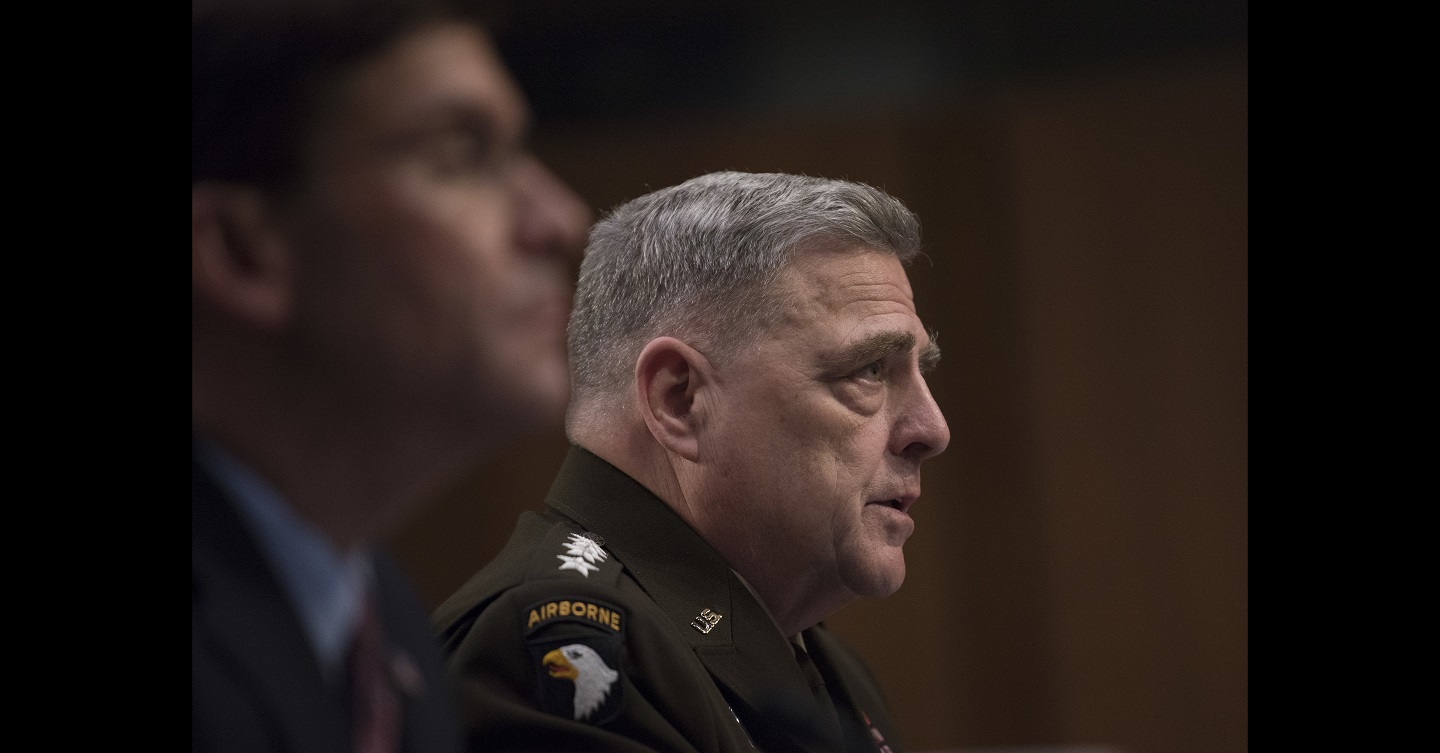
Before the events of 6 January in the nation’s capital, WAR ROOM received several submissions dealing with the topic of the military’s relationship with “politics.” It’s an extraordinarily complex discussion–from understanding, interpreting, and abiding by relevant law and regulation, to the importance of norms, and the very definition of what counts as “political” or “partisan”–none of these questions are simple. Investigations since the 6th have revealed at least one active and a number of former military members who appear to have been involved in varying degrees with the activities seen around the world on news feeds. In an attempt to further a useful discussion of the civil-military relationship WAR ROOM will publish these pieces over the next several weeks each Friday.
The first offering in this brief series is this article by Jovana Davidovic. She posits that the simple litmus test of not appearing partisan as a way of determining whether or not to speak out as a military member is problematic. Rather, the content of the discussion is more important: racism is wrong, genocide is wrong, torture is wrong—regardless of the political actor or party professing the idea.
I should not have been there. My presence in that moment and in that environment created a perception of the military involved in domestic politics. As a commissioned uniformed officer, it was a mistake that I have learned from, and I sincerely hope we all can learn from it.
-GEN Mark Milley
After facing intense criticism for his role in the now infamous Bible photo-op with President Trump, Gen. Mark Milley, Chairman of the Joint Chiefs of Staff, apologized for his presence at the event. General Milley remarked, “I should not have been there. My presence in that moment and in that environment created a perception of the military involved in domestic politics. As a commissioned uniformed officer, it was a mistake that I have learned from, and I sincerely hope we all can learn from it.”
General Milley’s remarks echo a sentiment that military officers and others have heard over and over again and have—for the most part—accepted as ground truth: the military should stay out of partisan politics. The consequences of a partisan military can be devastating, as history has shown repeatedly. But if recent events have taught us anything, it is that there may be times when staying neutral on domestic matters is irresponsible and wrong. It cannot possibly be that political neutrality requires silence, especially on issues such as genocide, torture, targeting civilians, or racial injustice. Therefore, it cannot be that everything that is political, or partisan is off limits. What General Milley should have said in his apology is not, “I shouldn’t have been there because it looks political,” but rather, “I shouldn’t have been there because racism is wrong and my presence implied, I think otherwise.”
The American Military’s Political Neutrality Rules
The political neutrality rules for the U.S. military are set out in the Uniform Code of Military Justice (UCMJ) and the DOD Directive 1344.10. The Department of Defense (DOD) defines ‘political’ activity as “activity supporting or relating to candidates representing, or issues specifically identified with, national or state political parties and associated or ancillary organizations.” The directive states, “A member of the Armed Forces on active duty shall not… participate in any radio, television, or other program or group discussion as an advocate for or against a partisan political party, candidate or cause.” The directive also prohibits contemptuous speech against offices of the President, Vice President, and Congress.
Political neutrality rules do not prohibit political engagement altogether. For example, members on active duty can vote, give monetary contributions to political organizations, attend political meetings, sign petitions, and write opinion pieces (albeit not as members of Armed Forces). While the official rules only apply to active duty members of the Armed Forces (a subset of these rules applies to all military members including National Guard and reservists), many veterans and retired military personnel, especially former general and flag officers, feel honor bound by these rules.
A politically neutral military is necessary for the common defense for a number of reasons. Primarily, a politically neutral military is valuable to the extent it helps “prevent politics from dividing troops from within and separating the military from the society it serves.” In other words, rules of political neutrality have two primary aims: promoting troop cohesion and morale and building and strengthening civil-military relations.
Regarding troop cohesion and morale, deep divisions within a military force threaten the force’s effectiveness and ability to unite behind a common cause. In addition, political neutrality helps leaders to maintain authority. Troops are less likely to follow their officers if they suspect them of acting in line with partisan political interests.
Concerning the relationship between the military and civil society, a non-partisan military is essential in establishing and maintaining the public’s trust. Despite a declining trust in many government institutions, nearly 83% of American adults have high confidence and trust in the military due to its political neutrality. Civilian trust in the military is necessary for effective oversight of military forces and even more important for the successful implementation of security and defense policy by trusted advisors.
In theory, the DOD’s rules and guidelines for political neutrality ought to promote troop cohesion and morale, help maintain civilian trust in the military, and support the effective implementation of security policy. However, the question remains whether, in practice, strict and narrow adherence to these political neutrality rules effectively advances these aims. I argue that it does not, and the current rules rely too heavily on the notion of ‘partisan issues.’
In 2016 when asked about then-presidential-candidate Donald Trump’s suggestion that the United States bring back waterboarding, U.S. Air Force Gen. Philip Breedlove said: “Rather than address any single element and to stay clearly out of a political sense, I would just tell you that I get a lot of questions from our European counterparts on our election process this time in general.” This is a problematic answer. In an attempt to avoid the appearance of weighing in on partisan politics, Gen. Breedlove clearly avoided the question of whether it is right to torture prisoners or enemy combatants. American military leaders can and ought to publicly and categorically condemn genocide, torture, and racism. The problem is that in the current U.S. political environment, standing up for basic values and human rights can appear to advance a partisan agenda. The perception of partisanship can also be exacerbated by the timing of public statements made by military personnel. In most cases, military leaders feel compelled to speak up on issues when political leaders have generated some controversy that threatens the military’s effectiveness or civil military trust.
Rules governing political speech should instead rely more on the content of the speech rather than on whether the topic is partisan in the current political environment.
The problem with using the concept of ‘partisan politics’ to identify when and whether military leadership can publicly speak up is that it depends too heavily on the contemporary political context. Rules governing political speech should instead rely more on the content of the speech rather than on whether the topic is partisan in the current political environment. While taking a partisan position could, under some circumstances, undermine troop cohesion, there are times when “partisan” speech could actually serve to advance troop morale and cohesion and civil-military trust. The perception that a public condemnation of genocide, torture, or racism by military officials is “partisan” should be overridden by the fact that speaking up against violations of human rights actually promotes the very aims that underpin and justify political neutrality rules. In fact, one might argue that military officers are not only permitted, but morally required to speak up when doing so serves the fundamental goals of an apolitical military. After all, if the importance of those goals justifies limiting service members’ political participation and freedom of expression, then those goals are important enough to obligate military officials to speak up in cases when the partisan political elements undermine military effectiveness.
Recently, scholars including Jim Golby, Peter Feaver, Loren Shulman, Risa Brooks, and Mara Karlin have suggested that the military might be becoming more politicized not from the inside, but by political leaders who have shrouded themselves with the public trust that the military carries by placing themselves philosophically or even physically close to military leaders. Jim Golby and Mara Karlin contend that arguments defending an entirely apolitical military are not useful. Instead there needs to be better guidance for military leaders on how to engage in political or near-political issues. Golby and Karlin suggest that instead of a blanket “military is apolitical” approach, the more realistic and useful approach focuses on three main rules: military leaders should avoid partisanship, institutional endorsements, and electoral influence. These rules would get us closer to the aims of political neutrality (troop cohesion and morale and civil-military trust) than a simple and contradictory “military should stay out of politics” approach. But what exactly does it mean to avoid partisanship in practice? As I have argued above, appearing partisan, cannot and should not be the only reason to avoid controversial speech. Instead, American military leaders ought to ask whether standing up for certain values or speaking out on important issues will serve to promote troop cohesion and morale and strengthen civil-military relations.
Speaking up against racism promotes troop cohesion and morale as it states clear expectations and values of racial equality. In June 2020, Gen. Robert Abrams, Commander for the U.S. forces Korea, publicly addressed the issue of racism in the military. He held a town hall with black service members on the subject of race and broadcast his message on Facebook. General Abrams not only affirmed the military’s organizational values in front of fellow service members, but also shared the military’s values of racial equality with the entire American public.
Speaking up against targeting civilians and torture, also more directly promotes the military’s goals and values, than simply staying apolitical. It signals to our enemies and allies that the U.S. military takes the obligations of international humanitarian laws and the Geneva Conventions seriously. After all, the primary way international laws govern warfare is by norm projection—states use international norms to justify action and criticize deviations from those norms. Standing up for the Geneva Conventions should not be seen as violating political neutrality rules, but instead as more directly advancing the primary aims of the military’s political neutrality rules.
Political neutrality rules must have limits. While it may be hard to judge when a military leader ought to speak up in an ever-changing political environment, one thing is clear: domestic issues that undermine troop morale and cohesion and civil-military relations are appropriate topics for public statements, regardless of the appearance of partisanship. Racial injustice, torture, genocide, and targeting civilians are a few of those topics.
Editor’s Note: On 12 January 2021, General Milley, along with the Joint Chiefs of Staff issued a message to the U.S. Joint Force. In it they condemned the violent actions in the Capitol building and reminded Service Members that “Any act to disrupt the Constitutional process is not only against our traditions, values, and oath; it is against the law.” They also acknowledged President-elect Biden as the next Commander in Chief.
Jovana Davidovic is an Associate Professor of Philosophy at the University of Iowa, where she also has a secondary appointment at the Law School and the Center for Human Rights. The views expressed in this article are those of the author and do not necessarily reflect those of the U.S. Army War College, the U.S. Army, or the Department of Defense.
Photo Description: Defense Secretary Dr. Mark T. Esper and Chairman of the Joint Chiefs of Staff Army Gen. Mark A. Milley provide testimony to the Senate Armed Services Committee for a defense budget posture hearing, Hart Senate Office Building, Washington, D.C., March 4, 2020.
Photo Credit: DoD photo by Lisa Ferdinando
Other Articles in our Civ-Mil MiniSeries:





Given that the article above emphasizes the issue of “morality” (“Rather, the content of the discussion is more important: racism is wrong, genocide is wrong, torture is wrong — regardless of the political actor or party professing the idea”), some context as to this issue, I suggest, might prove helpful. Here is my attempt at providing same:
1. The issues which sent the rioters to our nation’s capital are as old as capitalism itself. These such issues being — today as in the past — (a) unwanted political, economic, social and/or value change which (b) adversely effects a particular — previously provided for and privileged — group or groups:
“In any case, the argument for capitalism was based on long-term collective interest, an argument with little appeal to those left unemployed by the process of ‘creative destruction’ so central to capitalism, as entrepreneurial innovation led to the obsolescence of existing forms of production and those employed in them.” (From the book “The Mind and the Market: Capitalism in Western Thought,” by Jerry Z. Miller, in the section therein on Joseph Schumpeter.)
“All in all, the 1980s and 1990s were a Hayekian moment, when his once untimely liberalism came to be seen as timely. The intensification of market competition, internally and within each nation, created a more innovative and dynamic brand of capitalism. That in turn gave rise to a new chorus of laments that, as we have seen, have recurred since the eighteenth century: Community was breaking down; traditional ways of life were being destroyed; identities were thrown into question; solidarity was being undermined; egoism unleashed; wealth made conspicuous amid new inequality; philistinism was triumphant.” (Also from the book “The Mind and the Market: Capitalism in Western Thought,” in this case, from the section therein on Friedrich Hayek)
“Capitalism is the most successful wealth-creating economic system that the world has ever known; no other system, as the distinguished economist Joseph Schumpeter pointed out, has benefited ‘the common people’ as much. Capitalism, he observed, creates wealth through advancing continuously to every higher levels of productivity and technological sophistication; this process requires that the ‘old’ be destroyed before the ‘new’ can take over. … This process of ‘creative destruction,’ to use Schumpeter’s term, produces many winners but also many losers, at least in the short term, and poses a serious threat to traditional social values, beliefs, and institutions.” (From the book “The Challenge of the Global Capitalism: The World Economy in the 21st Century,” by Robert Gilpin, see the Introduction.)
2. Beginning in the 1980s, first the “establishment” Right (think Margaret Thatcher and Ronald Reagan), and then the “establishment” Left (think Tony Blair and Bill Clinton), chose to “throw in” with resurgent capitalism’s “winners” noted above. The U.S. Supreme Court would soon follow. This, obviously, left the community “losers” noted above — AND SPECIFICALLY THEIR “MORAL”/”TRADITIONAL” CONCERNS — out in the cold — as the following might illustrate:
“This Part will identify two crucial shifts in the Court’s understanding of the nature of individual rights, leading its jurisprudence to a radical rejection of history and experience as a source of moral value. The first involves a reduction in the power of the State to base its decisions of the moral values of the community, as evidenced in its traditions. The second involves an increase deference by the Court, not to the political branches, but rather to elite institutions and decisionmakers.”
“First ‘Lawrence’ furthers the deconstruction of the States as moral communities, capable of legislating in ways that might inhibit the functioning of markets for the sake of higher-order collective values. More specifically, ‘Lawrence’ diminishes the States ability to use criminal law to serve expressive and educative purposes, tending therefore to restrict criminal law to purely instrumental uses. Justice O’Connor’s concurrence in particular goes so far as to imply that a communally deliberated judgment on moral worth, as codified in the criminal law, cannot be distinguished from ‘a bare desire to harm’ the group whose activities the law condemns.”
(See the Catholic University of America, Columbus School of Law paper “Moral Communities or a Market-State: The Supreme Court’s Vision of the Police Power in the Age of Globalization” by Antonio F. Perez and Robert J. Delahunty. As to my two quoted items above, see Pages 690 and 694 respectively.)
Bottom Line Thought — Based on the Above:
Following in the footsteps of the “establishment” Right, the “establishment” Left and the U.S. Supreme Court above, the U.S. military, it would seem, has ALREADY formally intervened (a) on the side of the market “winners” and (b) in opposition to the various, previously protected and privileged, community “losers;” this, for (c) purported “national security” reasons:
“Even more telling than its use of elite opinion in ‘Lawrence’ was the Court’s unembarrassed reliance on elite views to determine the scope of a highly contested constitutional anti-discrimination norm in ‘Grutter.’ Relying extensively on amicus briefs submitted by elite corporate, military, and educational authorities, Justice O’Conner, writing for the majority, asserted the following:
“Major American businesses have made clear that the skills needed in today’s increasingly global marketplace can only be developed through exposure to widely diverse people, cultures, ideas, and viewpoints. What is more, high-ranking retired officers and civilian leaders of the United States military assert that ‘[based on their] decades of experience,’ a ‘highly qualified, racially diverse officer corps … is essential to the military’s ability to fulfill its principle mission to provide national security.’ …”
(See the Page 699 of the Catholic University of America paper “Moral Communities or a Market State” referenced above.)
This being the case, then could not the U.S. military, today, submit something akin to “amicus briefs” on current and future national security issues — in this case however — directly to the American people?
The question of whether a military official’s views are considered “partisan” or not — and thus whether such official’s views can be made public or not — this is an issue raised in our article above. In this regard, consider the following:
From an interview with LTG Loni Reynolds — now U.S.M.C. Deputy Commandant of Information:
“ ‘I believe that diversity of thought will matter in the future fight,’ Reynolds said.
Diverse force, especially in intelligence, she said, is not about quotas but about, ‘how we think about the tools we put in a toolbox or use keys on a keyboard.’
‘And I believe a dramatic mix of talent, of all races, religions, backgrounds and genders will be the difference in the future,’ she said.
The three-star noted how a variety of perspectives, languages and cultures all feed the intelligence understanding of adversaries and of the information environment, an aspect that near-peer competitors such as China and Russia do not hold.
‘We must talk about diversity as a warfighting necessity and tonight I’m declaring it essential to the information environment,’ Reynolds said.
‘I believe that diversity of thought will matter in the future fight,’ Reynolds said.
Diverse force, especially in intelligence, she said, is not about quotas but about, ‘how we think about the tools we put in a toolbox or use keys on a keyboard.’
‘And I believe a dramatic mix of talent, of all races, religions, backgrounds and genders will be the difference in the future,’ she said.
The three-star noted how a variety of perspectives, languages and cultures all feed the intelligence understanding of adversaries and of the information environment, an aspect that near-peer competitors such as China and Russia do not hold.
‘We must talk about diversity as a warfighting necessity and tonight I’m declaring it essential to the information environment,’ Reynolds said.”
(See the MarineCorpsTimes article “Diversity of ‘Races, Religions, Backgrounds and Genders’ Essential to Warfighting in the Information Age, 3-Star Says” by Todd South of September 30, 2019.)
Note how LTG Reynolds’ point-of-view, today, appears to agree with (least as relates to “diversity”) U.S. Supreme Court Justice Sandra Day O’Conner’s opinion back in 2003? (In this regard, see my initial comment above, at my “Bottom Line … “).
Question:
Given what amounts to “partisan politics” today, has LTG Reynolds — in expressing her views above re: “diversity,” etc. — even if such does relate directly to “national security” — has she thus, somehow, made a mistake/stepped over the line?